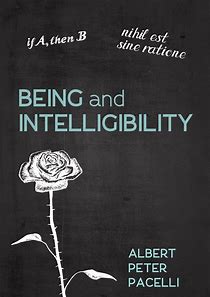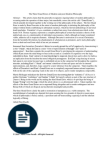Welcome
 I am the author of: Being and Intelligibility (Wipf & Stock, October 3, 2017), a metaphysical treatise on the meaning of being in its two senses; "The Three Grand Errors of Modern (and Post-Modern) Philosophy," an article on the resurrection of metaphysics that has been submitted for publication; and The Speculator’s Edge (John Wiley & Sons, April 25, 1989), an analysis of the role played and methods used by speculators in free market economies; and numerous articles on various legal topics. I hold a BA and MA in political philosophy from the University of Pennsylvania (both earned in 1974) and a JD from the New York University School of Law (1977).
I am the author of: Being and Intelligibility (Wipf & Stock, October 3, 2017), a metaphysical treatise on the meaning of being in its two senses; "The Three Grand Errors of Modern (and Post-Modern) Philosophy," an article on the resurrection of metaphysics that has been submitted for publication; and The Speculator’s Edge (John Wiley & Sons, April 25, 1989), an analysis of the role played and methods used by speculators in free market economies; and numerous articles on various legal topics. I hold a BA and MA in political philosophy from the University of Pennsylvania (both earned in 1974) and a JD from the New York University School of Law (1977).
Central to my thinking is that the widely held view that metaphysics is dead is a mistaken conclusion, that metaphysics is indeed possible and important, and that successful metaphysics must be founded upon the establishment of the objective knowledge with which it is conducted and, especially, its presupposition of a persistent, substantive, cognizing self. These ideas are reflected in my recent writings and, I expect, will continue to be a primary focus for me, which will be reflected here.
On this site, you will find information about my research and books, as well as occasional blogs about philosophical and economic topics, including how they reflect themselves in current events.
Why Philosophy?
 Although the question, “Why philosophy?” is often asked by philosophers and their students, it is one that is uniquely modern. Most philosophers, and perhaps only a few others, are aware that until the advent of the Scientific Revolution, philosophy was the all-embracing science. There was no meaningful distinction between philosophy, on the one hand, and mathematics, the natural sciences, psychology, or sociology, on the other. All of these were simply part of the pursuit of what was presumed to be an attainably homogenous human understanding of self and the world. The question of the value of philosophy was therefore identical to the question of the value of knowledge itself, and, outside of sophist or skeptic circles, it would have been met with ridicule. I do not mean to suggest that at any one time since Thales of Miletus initiated the Western philosophical tradition circa the sixth century B.C., that philosophy has been conducted by more than a small number of scholars. Neither do I mean that the value of philosophy has ever been appreciated by a large portion of the men and women of commerce or other more practical concerns. Instead, what I am saying is that in the philosophical community, prior to the modern era which began with the mind-body dualism of René Descartes in the early 17th century A.D., the value of philosophy was taken as a given. Indeed, from the ancient Greeks through the church philosophers up to and including St. Thomas Aquinas in the high Middle Ages, it was generally recognized that humankind’s faculty of objective reason, which set it apart from the other creatures of the earth, rendered philosophic contemplation humankind’s highest vocation. But the Scientific Revolution, which followed not long afterward, brought with it a new, “scientific” method of investigating physical realities that is inapplicable to the study of philosophy’s metaphysical questions. The result was the separation of the empirical sciences from contemplative philosophy and the rapid development of demonstrable facts about the world of the former’s domain. Then, the unthinkable happened—the disparity between the achievements of the physical, social, and psychological sciences and the lack of progress of what remained of philosophy grew to be so great that philosophy ceased to be considered to be a science at all! And so, it was only a question of time before philosophers would begin to ask the question “Why philosophy?”
Although the question, “Why philosophy?” is often asked by philosophers and their students, it is one that is uniquely modern. Most philosophers, and perhaps only a few others, are aware that until the advent of the Scientific Revolution, philosophy was the all-embracing science. There was no meaningful distinction between philosophy, on the one hand, and mathematics, the natural sciences, psychology, or sociology, on the other. All of these were simply part of the pursuit of what was presumed to be an attainably homogenous human understanding of self and the world. The question of the value of philosophy was therefore identical to the question of the value of knowledge itself, and, outside of sophist or skeptic circles, it would have been met with ridicule. I do not mean to suggest that at any one time since Thales of Miletus initiated the Western philosophical tradition circa the sixth century B.C., that philosophy has been conducted by more than a small number of scholars. Neither do I mean that the value of philosophy has ever been appreciated by a large portion of the men and women of commerce or other more practical concerns. Instead, what I am saying is that in the philosophical community, prior to the modern era which began with the mind-body dualism of René Descartes in the early 17th century A.D., the value of philosophy was taken as a given. Indeed, from the ancient Greeks through the church philosophers up to and including St. Thomas Aquinas in the high Middle Ages, it was generally recognized that humankind’s faculty of objective reason, which set it apart from the other creatures of the earth, rendered philosophic contemplation humankind’s highest vocation. But the Scientific Revolution, which followed not long afterward, brought with it a new, “scientific” method of investigating physical realities that is inapplicable to the study of philosophy’s metaphysical questions. The result was the separation of the empirical sciences from contemplative philosophy and the rapid development of demonstrable facts about the world of the former’s domain. Then, the unthinkable happened—the disparity between the achievements of the physical, social, and psychological sciences and the lack of progress of what remained of philosophy grew to be so great that philosophy ceased to be considered to be a science at all! And so, it was only a question of time before philosophers would begin to ask the question “Why philosophy?”

